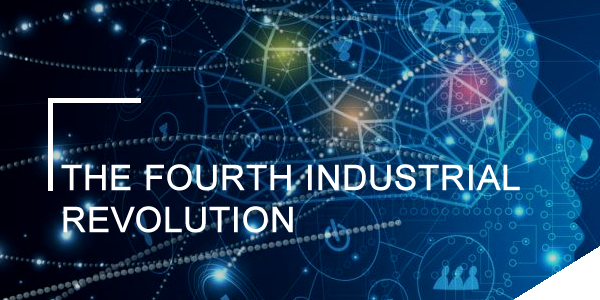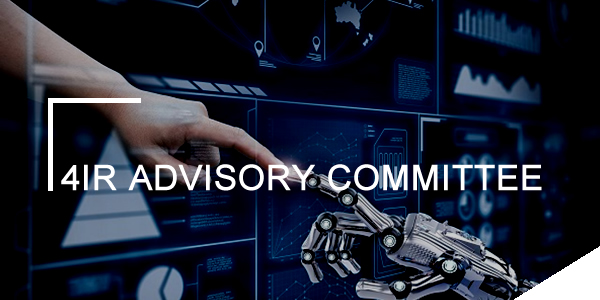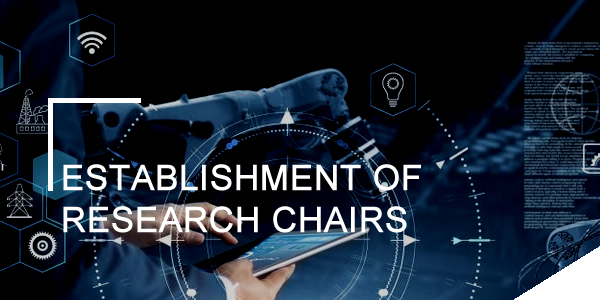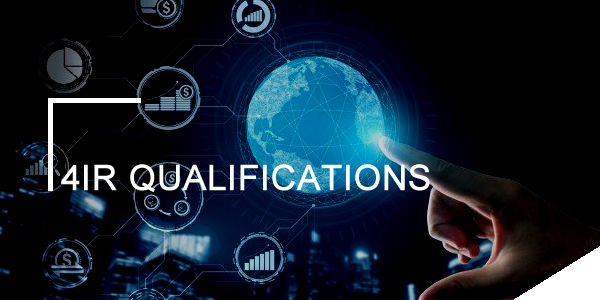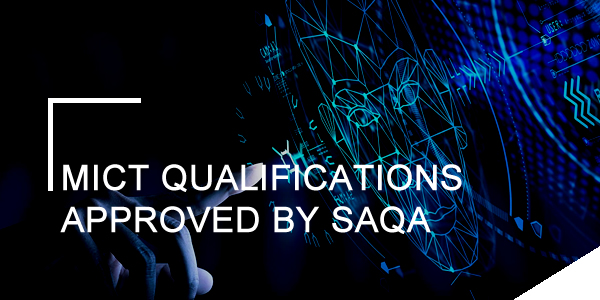The Fourth Industrial Revolution
THE FOURTH INDUSTRIAL REVOLUTION
THE FOURTH INDUSTRIAL REVOLUTION
The Fourth Industrial Revolution (4IR) is an era where people are using smart, connected and converged Cyber, Physical and Biological systems and smart business models to define and reshape the social, economic and political spheres. ‘ (PC4IR, 2020).
The advent of the Fourth Industrial Revolution (4IR) has necessitated that the MICT SETA establish a new Division, developed 4IR Integrated Digital Skills Strategy and established 4IR Advisory Committees to enable an inclusive sectoral approach.
4IR ADVISORY COMMITTEE
The MICT SETA has subsequently formed a Fourth Industrial Revolution (4IR) Skills Advisory Committee that aims to provide input and guidance on the major technological shifts, innovation and workforce strategies that will impact skills planning and implementation.
The Committee is made up of four (4) work streams (Research, Education, Policy and Labour) and the chairpersons of each stream constitute one committee.
The role of the Advisory Committee is to:
- Develop an integrated MICT SETA strategy and plan to respond to the 4IR.
- Advise on strategies to enhance MICT subsector’s global competitiveness;
- Advise on a research programme to advance 4IR;
- Advise on the skills development and future of work;
- Make recommendations on enabling relevant infrastructure for South Africa to participate in the digital economy
- Scale-up skills development for the youth in data analytics, coding, the internet of things, blockchain and machine learning;
- Design a social plan to address re-training and support for workers that could potentially be displaced by new technologies;
- Open up opportunities for young people to develop new software and applications, devices and equipment through specialised start-up support programmes; and
- Give enhanced support to existing innovation centres and hubs over the next three years
ESTABLISHMENT OF RESEARCH CHAIRS
Chapter 9 of the National Development Plan (NDP) sets a range of numerical objectives to be met by 2030, including the objectives listed below:
- Produce more than 100 doctoral graduates per million per year by 2030. This implies an increase from 1,420 in 2010 to well over 5,000 a year; and
- Expand science, technology and innovation outputs by increasing research and development spending by government and through encouraging industry to do so.
Through our 4IR Research chairs we fund Masters and Doctoral Students pursuing 4IR related research projects. We established 4IR Research Chairs at the following institutions:
Tshwane University of Technology
University of Western Cape
Durban University of Technology
University of Johannesburg
University of Kwa-Zulu Natal
University of Limpopo
4IR QUALIFICATIONS
The MICT SETA further embarked on a process of developing qualifications to respond to the digital and future skills gaps introduced by the technological advancement.
To date, thirty-two qualifications have been developed
- Artificial Intelligence
- Cyber security;
- Cloud computing;
- Data science;
- Software development;
- Internet of things;
- Robotic Processing Automation
- Design thinking
- Quality engineering Automation and
- e-Waste
- Mobile Computing Technician Devices (*(P) means: part qualification)
- *Mobile Device Repairer (P)
- *Laptop Repairer (P)
- *Wearable Repairer(P)
- *Accessories Repairer (P)
- Drone Technician
- Remote Piloting Aircraft (RPAS)
- Remote Piloting Aircraft (RPAS) Technician
- Blockchain
- Optical Fibre
- Extended Reality
- Virtual Reality
- 3D Printing
- 5G
- Web Design
- Cyber Security
- Technopreneur
- Python
- HTML
- Java
- Java script
- C++
MICT QUALIFICATIONS APPROVED BY SAQA:
List of approved full qualifications:
| No. | Qualification Title | NQF level | Qualifications Credits | Qual ID |
| 1 | Occupational Certificate: Cloud Administrator | 4 | 149 | 118699 |
| 2. | Occupational Certificate: Design Thinking Innovation Lead | 4 | 160 | 118788 |
| 3. | Occupational Certificate: Design Thinking Practitioner | 4 | 100 | 118705 |
| 4. | Occupational Certificate: Software Developer | 5 | 220 | 118707 |
| 5. | Occupational Certificate: Quality Test Automator | 5 | 179 | 118789 |
| 6. | Occupational Certificate: Data Science Practitioner | 5 | 185 | 118708 |
| 7. | Occupational Certificate: Artificial Intelligence Software Developer | 5 | 209 | 118792 |
| 8. | Occupational Certificate: Cybersecurity Analyst | 5 | 173 | 118986 |
| 9. | Occupational Certificate: Artificial Software Developer | 5 | 209 | 251201 |
| 10. | Occupational Certificate: Cloud Administrator | 4 | 149 | 252301 |
| 11. | Occupational Certificate: Cybersecurity Analyst | 5 | 173 | 252901 |
| 12. | Occupational Certificate: Design Thinking Innovation Lead | 4 | 160 | 242102 |
| 13. | Occupational Certificate: Design Thinking Practitioner | 5 | 100 | 251102 |
| 14. | Occupational Certificate: Quality Test Automator | 5 | 179 | 251901 |
| 15. | Occupational Certificate: Software Developer | 5 | 220 | 251201 |
| 16. | Occupational Certificate: Data Science Practitioner | 5 | 185 | 251102 |
| 17. | Occupational Certificate: E -waste Operator Controller | 4 | 167 | 311906 |
| 18. | Occupational Certificate: Internet of Things | 4 | 141 | 251201 |
| 19. | Occupational Certificate: Robotic Processing Automation Developer | 5 | 185 | 251201 |
| 20. | Occupational Certificate: Mobile Computing Technician Devices | 4 | 172 | 672205 |
| 21. | Occupational Certificate: Drone Technician | 4 | 311401 | |
| 22. | Occupational Certificate: Remote Piloting Aircraft | 4 | 128 | 733211 |
| 23. | Occupational Certificate: Remote Piloting Technician | 4 | 212 | 311401 |
| 24. | Occupational Certificate: Blockchain | 6 | 284 | 251201 |
| 25. | Occupational Certificate: 3D Printing | 6 | 252 | 713201 |
| 26. | Occupational Certificate: Xtended Reality | 6 | 218 | 251301 |
| 27. | Occupational Certificate: Optical Fibre | 5 | 219 | 672202 |
| 28. | Occupational Certificate: Quantum Computing | 5 | 179 | |
| 29. | Occupational Certificate: Embedded Systems Developer | 5 | 183 | 311401 |
| 30. | Occupational Certificate: Substation Automation | |||
| 31. | Occupational Certificate: PCB Design Technician Fabrication | 4 | 169 | 311401 |
| 32. | Occupational Certificate: Automotive Ethernet Technician | 5 | 125 | 214402 |
| 33. | Occupational Certificate: Electronic Engineering Technician | 4 | 137 | 311401 |
| 34. | Occupational Certificate: Data Science Engineer | 5 | 165 | 251102 |
| 35. | Occupational Certificate: Smart Grids Communications | |||
| 36. | Occupational Certificate: Cryptographer | 5 | 252901 |
4IR Part Qualifications
| No. | Qualification Name | Occupational Code | Occupational Title | NQF Level |
| 1. | Mobile Device Repairer (Part qualification) | 672205 | Mobile Computing Technician Devices | 4 |
| 2. | Laptop Repairer (Part qualification) | 672205 | Mobile Computing Technician Laptop Repairer | 4 |
| 3. | Wearable Repairer (Part qualification) | 672205 | Mobile Computing Technician Laptop Repairer | 4 |
| 4. | Accessories Repairer (Part qualification) | 672205 | Mobile Computing Technician Accessories | 4 |
| 5. | Peripherals Repairer | 672205 | Mobile Computing Technician Peripheral | 4 |
4IR Skills Programmes:
| No. | Skills Programme Descriptor | NQF Level | Credits |
| 1. | Fifth Generation (5G) | 4 | 16 |
| 2. | Technopreneur | 4 | 60 |
| 3. | Java Programmer | 4 | 53 |
| 4 | Java Programmer | 4 | 60 |
| 5. | Cybersecurity Defender | 4 | 60 |
| 6. | Python Programmer | 4 | 60 |
| 7. | HTML Programmer | 4 | 60 |
| 8. | Java script Programmer | 4 | 60 |
| 9. | Scrum | 5 | 36 |
| 10. | Agile | 5 | 33 |
| 11. | Apache Groovy | 5 | 63 |
| 12. | UI/UX | 5 | 43 |
| 13. | Reactive Native | 5 | 40 |
| 14. | Go Groovy | 5 | 59 |
| 15. | Ruby | 5 | 59 |
| 16. | Digital Terrestrial TV Decoder Installer | 5 | 42 |
| 17. | Digital Product Designer | 5 | 43 |
| 18. | Digital Literacy Trainer | 5 | 39 |
| 19. | ICT Trainer | 4 | 46 |
4IR Learnerships
| No. | Name | NQF Level | Credits |
| 1. | Occupational Certificate: Cloud Administrator | NQF Level 04 | 149 |
| 2. | Occupational Certificate: Design Thinking Innovation Lead | NQF Level 04 | 160 |
| 3. | Occupational Certificate: Design Thinking Practitioner | NQF Level 04 | 100 |
| 4. | Occupational Certificate: Software Developer | NQF Level 05 | 220 |
| 5. | Occupational Certificate: Quality Test Automator | NQF Level 05 | 179 |
| 6. | Occupational Certificate: Data Science Practitioner | NQF Level 05 | 185 |
| 7. | Occupational Certificate: Artificial Intelligence Software Developer | NQF Level 05 | 209 |
| 8. | Occupational Certificate: Cybersecurity Analyst | NQF Level 05 | 173 |
Data Science Practitioner EISA Exemplar Paper Tools
- Data Science Practitioner EISA Exemplar Paper
- Data Science Practitioner EISA Exemplar Paper Memo
- Data Science Practitioner – Rubric
- Exemplar Resources
Cloud Administrator EISA Exam Tools
